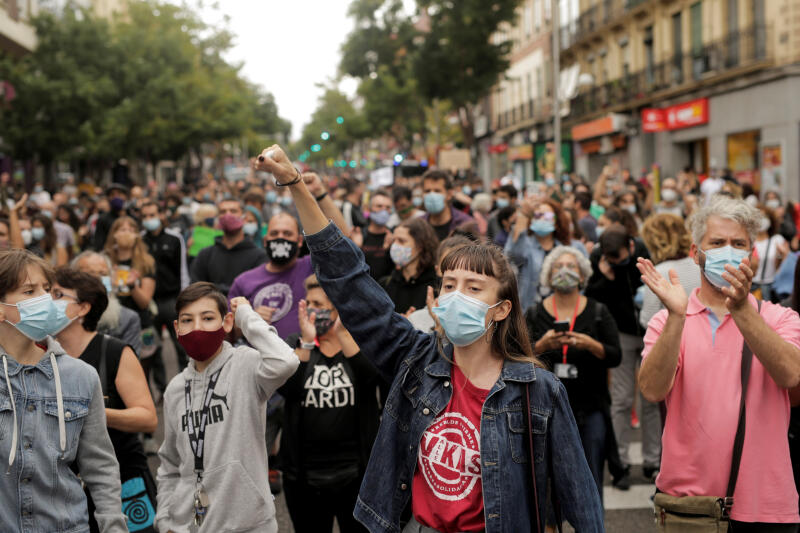Madrid braces for partial lockdown as coronavirus surges
Sign up now: Get ST's newsletters delivered to your inbox

People march in protest of Covid-19 restrictive measures in Madrid, on Sept 20, 2020.
PHOTO: REUTERS
MADRID (AFP) - Nearly a million Madrid residents were bracing Sunday (Sept 20) for a partial lockdown with several hundred marching in protest as Spanish authorities seek to put a brake on a second wave of Covid-19.
The restrictions, which take effect Monday for two weeks, affect 850,000 people living mainly in densely-populated, low-income neighbourhoods in the south - or 13 per cent of the 6.6 million people living in and around the capital.
Like many countries in Europe, Spain is battling a coronavirus surge and, once again, Madrid is the worst-hit region.
"We're concerned with the data we're seeing, because the number of cases is double that of the national average and the number of hospital admissions... is triple the national average," Prime Minister Pedro Sanchez said in a television interview Saturday.
But he stressed he was not contemplating a national lockdown.
Several districts of southern Madrid have counted more than 1,000 cases per 100,000 inhabitants - around five times the national average, which in itself is the highest in the European Union.
Residents will be banned from leaving their district other than for essential travel like work, medical care or taking children to school, Madrid's regional government said Friday.
They will be allowed to move around freely inside their zone but no one from outside will be allowed in unless absolutely essential.
Parks will be closed but shops, bars and restaurants will remain open at 50 per cent capacity.
Meanwhile, gatherings of more than six people will be banned in the entire region, down from ten currently.
On Sunday, people took to the streets in some of the affected districts in protest against the new measures.
They sported placards reading "No to a class-based lockdown" or "They're destroying our district and now they're locking us up".
Hundreds gathered in the districts concerned and outside the regional parliament to shout their displeasure.
"The health centres having been working for years with minimum staffing, they don't have enough staff or nurses... and this crisis has made the situation worse," lamented Victoria, a 63-year-old civil servant.
"You get the impression they take us for fools. We shall be able to continue to go and work in other non-confined zones at the risk of ramping up transmission, and we shall also be able to infect ourselves within our own zone," Bethania Perez, a nurse aged 31, told AFP.
Madrid's regional president Isabel Diaz Ayuso, who has been slammed for her management of the crisis, is due to meet Sanchez on Monday.
The meeting is a sign of central government concern over the crisis in Madrid, as the management of public health issues is normally the responsibility of Spanish regional authorities.
Regional health officials say Madrid's healthcare system is under growing pressure, with one in five hospital beds occupied by Covid patients.
As such, experts fear a sharp increase in the regional mortality rate - which is currently much lower than in the spring - over the coming weeks.
Spain has so far recorded over 30,000 deaths - one of Europe's worst tolls - and 600,000 confirmed cases, according to official figures.


